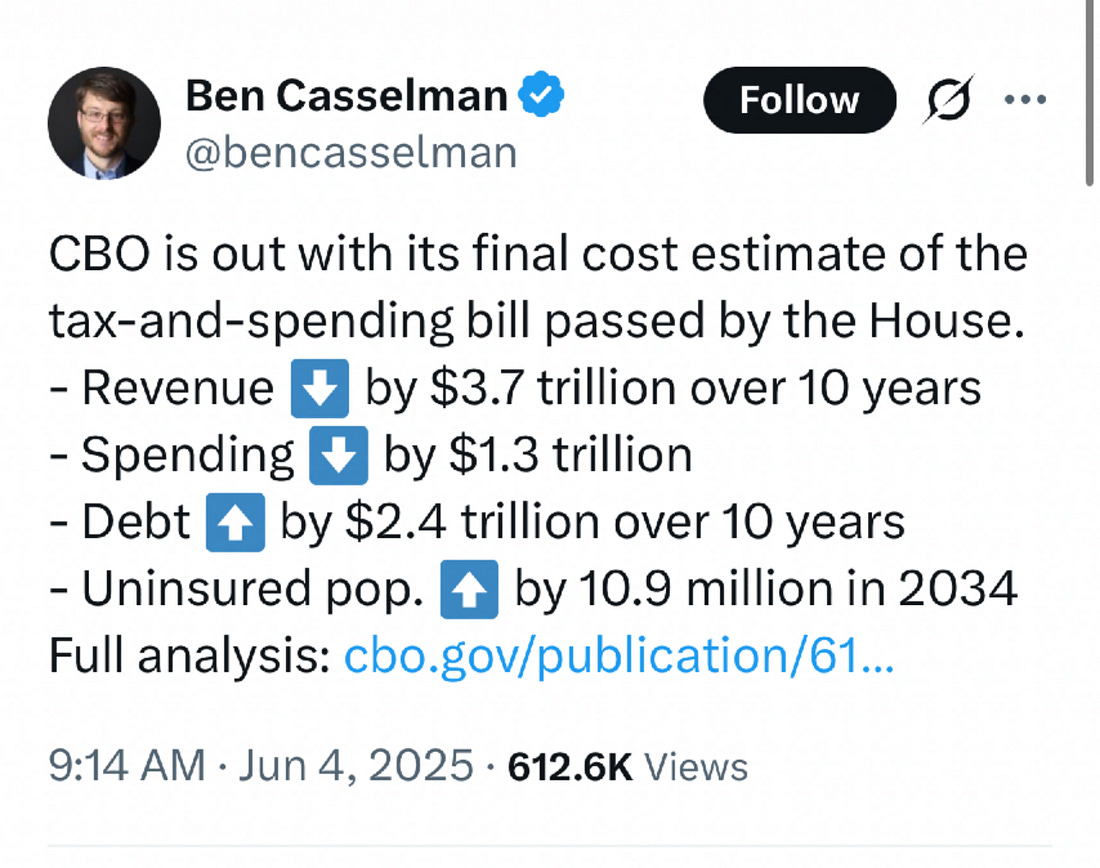|
Welcome to You’re Probably Getting Screwed, a weekly newsletter and video series from J.D. Scholten and Justin Stofferahn about the Second Gilded Age and the ways economic concentration is putting politics and profits over working people.
Welcome to You’re Probably Getting Screwed, a weekly newsletter and video series from J.D. Scholten and Justin Stofferahn about the Second Gilded Age and the ways economic concentration is putting politics and profits over working people.
It’s not everyday that I agree with Elon Musk (even the reasons we don’t like this bill are different) but here we are… He called the “One Big, Beautiful Bill” that President Trump and Republicans are pushing the Senate to pass after the House already did a "disgusting abomination."
In a series of posts on X on Tuesday, Musk said that the "outrageous, pork-filled" spending bill will "massively increase the already gigantic budget deficit to $2.5 trillion (!!!) and burden America [sic] citizens with crushingly unsustainable debt".
And here’s the Congressional Budget Office (CBO) analysis:
This is going to hurt a lot of different communities, especially rural ones. Here’s the impact:
Guts rural healthcare
Takes food off the tables of rural people
Shifts costs to states and local governments
Takes away local control
Ends clean energy and infrastructure tax credits and funding
Provides handouts to agribusiness and mega farms
This bill is incredibly unpopular, rightfully so. The best way to tell your friends and your U.S. Senators about why it’s bad are:
Cuts to Medicaid and Medicare and tax breaks for the wealthiest Americans are viewed as the most harmful policies.
Health coverage being taken away is the most effective framing against work requirements.
YOU’RE PROBABLY (ALSO) GETTING SCREWED BY:
PepsiCo
We mentioned last week that the FTC reversed course and dropped a lawsuit it had brought during the Biden Administration against Pepsi for giving special deals to Walmart. Connecticut Senator Chris Murphy sat down with South Dakota grocer RF Buche to discuss the implications of the FTC’s actions.
Data Centers
In his quest to catch up in the AI arms race, Elon Musk built a massive data center in Memphis that is burning enough gas to power a small city and doing so with no permits and no pollution controls. Something to keep in mind when you someone claims that America’s biggest problem is barriers to building things.

Big Tech
We’ve been closely following a provision in the “Big Beautiful Bill” that would prevent states from regulating artificial intelligence for a decade. The provision is so bad that even Georgia Congresswoman Majorie Taylor Greene, despite voting for the bill, is now disavowing it and calling for it to be removed. A bipartisan group of 260 state legislators, including myself, signed a letter demanding Congress strip this provision from the bill. If you do not see your legislator on the letter, tell them to add their name.
Housing Monopolies
Antitrust attorney Basel Musharbash has a new piece in Matt Stoller’s BIG exploring how consolidation has contributed to rising home prices in the Dallas-Ft. Worth region, but is a microcosm of some of the key factors that have driven up housing costs by over 50% nationally. We covered the monopolies driving up housing costs here.
The Federal Reserve
Make the banks Too Big To Fail Again? The central bank announced this week that it was lifting a 2018 restriction on Wells Fargo that had capped the megabank’s assets at $1.95 trillion. The cap was a response to the fake accounts scandal at Wells Fargo, but just last year the bank was found to be violating anti-money laundering, consumer protection, and securities laws by a number of agencies.

Corporate Lobbyists
One of the best things state legislators could do for workers is ban noncompete clauses, which prevent workers from switching jobs or creating a new business. Pat Garofalo has the latest on corporate fear campaigns in Minnesota and New York designed to stop or weaken current prohibitions on noncompetes.
FIFA & MLS
Several Major League Soccer (MLS) teams will be competing in a FIFA-organized tournament called the FIFA Club World Cup that could result in a major windfall for MLS and team owners, but players are demanding their fair share of the prize money. The MLSPA, the players union, issued a statement on the matter and members of the Seattle Sounders protested over the weekend by donning shirts calling out FIFA and MLS for their “cash grab.”
SOME GOOD NEWS
Oregon stands up to private equity
Legislators in the Beaver State have passed a bill that would close loopholes in a state law meant to prevent corporate control over healthcare providers. The bill takes particular aim at addressing private equity’s growing role in healthcare.
DC secures first settlement in RealPage case
Attorney General Brian Schwalb announced they have secured a $1 million settlement with one of the property management companies implicated in the city’s RealPage price-fixing lawsuit. While unfortunately the settlement allows the firm to avoid any admission of anticompetitive conduct, it is still an encouraging first step in addressing one of the drivers of increasing rents.
BEFORE YOU GO
Before you go, I need two things from you: 1) if you like something, please share it on social media or the next time you have coffee with a friend. 2) Ideas, if you have any ideas for future newsletter content please comment below. Thank you.
Standing Tall for All,
J.D. Scholten


